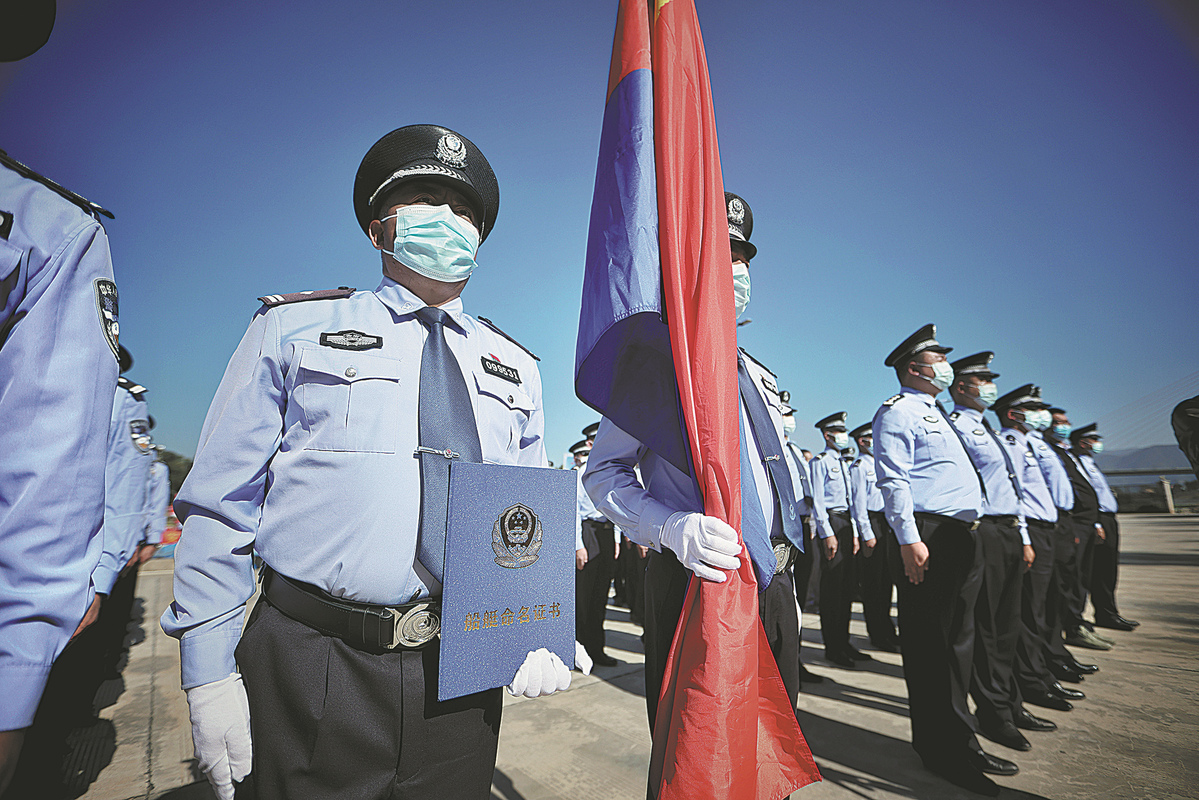Joint patrol teams keep Mekong safe
By LI YINGQING in Kunming and CHEN MEILING | China Daily | Updated: 2022-01-14 07:39

Security threats
The 4,900-km Mekong, known in China as the Lancang, originates in the Tanggula Mountains in Qinghai province, flowing through Myanmar, Laos, Thailand and Cambodia, before entering the South China Sea in Vietnam.
One of the most important river systems for international trade, criminals pose a threat to the Mekong, which flows through diverse terrain.
At 10:30 am on Dec 10, 2011, three signal flares rose into the sky as five law enforcement patrol boats and 10 cargo vessels set off on the Mekong, marking the first joint operation by the four countries as well as the reopening of the waterway to international shipping after a suspension of more than two months.
Ten years to the day, the joint patrol and law enforcement cooperation mechanism has completed 111 patrols, during which more than 17,000 team members have cracked some 36,000 drug cases and 66 human trafficking offenses. A total of 107 suspects and 2,659 stowaways have been seized, according to the public security authority in Yunnan.
Now, vessels from the four countries patrol the river 25 days a month on average.
On Dec 13, the 112th joint operation was completed, with China sending newly developed high-speed vessels to better crack down on crimes and respond to emergencies. When the mission began three days earlier, officials, company representatives and residents gathered at riverside ports to hang banners marking the 10th anniversary of the joint patrols.
Yuan Yaping, who is in charge of the Yunnan Public Security Department's marine patrol team, said completion of the 112th mission heralded the second decade of the joint cooperation.
"Together with law enforcement departments in Laos, Myanmar and Thailand, we will make the Mekong a river of peace, friendship, development and happiness, in line with building a shared future for mankind," Yuan added.
In recent years, use of advanced equipment such as water rescue robots and automatic reconnaissance vessels has improved the efficiency of patrols. To cope with the pandemic, a zero-contact policy was adopted between police officers from the four countries.
When the pandemic emerged, Guo Wei, a doctor from a Mekong patrol vessel, had just returned to Kunming, capital of Yunnan, from his hometown of Chengdu, the Sichuan provincial capital. He visited a number of hospitals and sent the first batch of medical necessities to meet the urgent needs of his colleagues.
Guo helped draw up personal safety protection guidance and also routinely contacted providers to guarantee medical supplies. He called for police officers to be vaccinated as soon as possible and helped take out accident and COVID-19 insurance coverage for more than 1,000 people.
As a middle school student, he learned of the murders on the Mekong in 2011 from television news reports.
In 2017, Guo boarded a patrol boat for the first time. "Everyone looked so confident and brave, but this only added to my nerves," he said. "I prepared all the drugs and bandages they might need. I also thought about what I should do in the event of a shooting. I was so anxious that I barely slept for days."
Still relatively young, but more experienced, Guo's reputation has risen in the past four years, even among foreigners.
Before the pandemic, every time his vessel berthed in another country, local residents, especially the poor, waited in long lines to seek help from Guo, as news spread that he was "a Chinese doctor offering free medical services and free drugs".
A policeman in Laos with severe back pain sought help from Guo at every opportunity. "His magic acupuncture can ease my agony in minutes," the officer said.
























